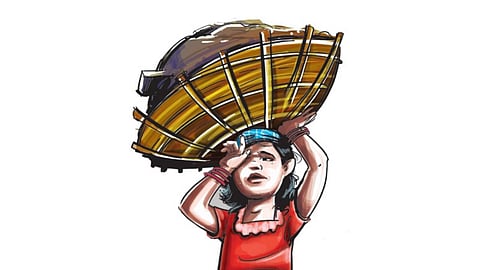Child labour scene worsens in urban Bengaluru: NGO report
BENGALURU: Despite years of progress and policy reforms, child labour continues to cast a shadow over the children of South India. Marking the World Day against Child Labour, a recent report by the Child Rights and You (CRY) Foundation reveals that 16% of children aged 6 to 18 in the region are engaged in either full-time or part-time work, a direct violation of their right to education and protection. From agricultural fields and livestock management and more, children are being stripped of their childhood and basic rights.
The report is based on surveys conducted across selected districts in four south Indian states —Andhra Pradesh, Karnataka, Tamil Nadu, and Telangana— primarily focusing on rural areas. In Karnataka, 8,413 children aged 6 to 14 were surveyed in four districts, and 443 were found to be involved in child labour. Among those aged 15 to 18, the number rose to 509 of 2,750 children.
Harry Jeyakaran, AGM, CRY Program, and State Lead for Karnataka and Tamil Nadu, highlighted the lack of school accessibility in rural areas as a major factor contributing to this crisis.
“According to the RTE Act, every village should have a primary school within 1 km, a middle school within 3 km, and a high school within 5 km. But in our operational areas, only 60-70% of villages have a nearby primary school. The numbers drop sharply- only 40% have middle schools, and just 10-12% have access to high schools or PUC,” he explained.
“The situation tends to worsen in urban Bengaluru, where many of these children end up falling into substance abuse,” he warned. “Earlier, we mostly saw this issue among children aged 17–18, but now it’s alarming we’re seeing cases starting as early as age 12,” he said.
Most schools don’t have full-time appointed teachers. Guest teachers are not well-qualified or properly trained. “There’s a visible lack of passion and commitment among them,” he said. “This isn’t just a school-level issue; there are systemic gaps and failures at government level in appointing permanent staff. All these factors contribute to children losing interest in education or simply not wanting to go to school at all,” he added.
“Children are being trafficked to rural areas for manual labour, especially in brick kilns, agriculture, floriculture, and seed production, a major industry in regions like Haveri, Gadag, Chitradurga, and Davanagere,” said Vasudeva Sharma NV, Executive Director, Child Rights Trust.
The question of what happens to children after the age of 14 remains largely unaddressed. While the RTE Act ensures free and compulsory education only up to age 14, there is little provision for continued schooling beyond that. “The The Child Labour (Prohibition and Regulation) Act should be called the Child Labour (Prohibition) Act and ‘regulation’ must be removed,” he suggested, adding, “There must be a legal right to education up to 18 years.”

